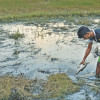Pollution causes 1 in 4 deaths
A quarter of all premature deaths and diseases worldwide are due to environmental pollution and climate change, says a landmark report of the United Nations.
It also said a greater portion of the deaths occurred in developing countries or in populations in “vulnerable situations”.
“Our planet is becoming increasingly unhealthy, and this is having a direct impact on human life. More than 12.6 million people died from environmental causes in 2012. That represents nearly one quarter of all deaths worldwide that year,” the report said.
The sixth Global Environment Outlook, released yesterday at a UN conference in Nairobi, Kenya, portrayed a gloomy picture of the planet.
A total of 252 scientists and experts from over 70 countries were involved in making the report.
The report was negotiated and agreed to by more than 100 countries, including Bangladesh.
According to the report, Bangladesh is one of the fastest urbanising countries in the world and its capital Dhaka has one of the most polluted air.
The report identified air pollution as a cause of 6-7 million early deaths across the world annually.
Furthermore, the report found Bangladesh to be one of the top groundwater extracting countries in the world and said that a lack of awareness or understanding of water quality problems may hinder safety of drinking water services.
“In Bangladesh, while tube wells have increased, water quality testing is not commonly practiced. This contributes to poor understanding of the health risks posed by both microbial and non-microbial contaminants. This can have serious consequences in terms of public health.”
The report said measures taken in the 1970s to reduce the health impact of microbial disease from surface-water use resulted in the widespread installation of tube wells, themselves a source of water with high levels of inorganic arsenic.
“Populations using these sources of drinking water have experienced severe health consequences ranging from skin lesions to cancer and cognitive effects, resulting in stigmatisation and other serious social impacts.”
It warned that pollutants in the country's freshwater systems would see anti-microbial resistance become a major cause of death by 2050.
Globally, around 1.4 million people die each year from preventable diseases such as diarrhoea and parasites linked to pathogen-riddled water and poor sanitation, resulting from a lack of access to safe drinking water.
The report, though, praised the Bangladesh government's initiative to achieve the Sustainable Development Goals targets.
Praising the Bangladesh government's initiative to ban polythene in 2002, the report said Bangladesh became the first country in the world to completely ban thin plastic bags. The decision came after it was realised that around 80 per cent of the water-logging in cities during floods was caused by polyethylene bags blocking drains and increasing standing water.
AN INCREASINGLY UNHEALTHY PLANET
Climate change, threatened biodiversity, population growth, land degradation, air pollution, plastic use, pesticides and hormone-changing chemicals in the water are making the planet an increasingly unhealthy place for people, according to the report.
“Our planet is sick, but we know how to nurse it back to health. The first system that we need to transform is one that affects all of us intimately, every day: food.
“As the global population grows and climate pressures increase, we will have to start producing our food with greater efficiency and resilience, and we have to encourage people everywhere to adopt diets that are more sustainable,” said the report.
The report concludes “unsustainable human activities globally have degraded the Earth's ecosystems, endangering the ecological foundations of society.”
It suggested changing the ways the world eats, buys things, gets its energy and handles its waste to help fix the problems.
Bangladesh is one of the most vulnerable countries in terms of food security and climate change.
“Our planet is suffering. The climate is warming, species are going extinct, natural resources are being wasted, and many of our ecosystems are under enormous stress,” the report warned.
“But there's good news too. Hunger is on the decline, innovation is taking off, and people everywhere are seeking out ways to live more sustainably.”
The report went on to highlight the fact that the world had the science, technology and finance to move towards a more sustainable development pathway, although sufficient business, political and public support was still missing from the public.
The scientists said the most important and pressing problems facing humankind were global warming and loss of biodiversity, due their permanence and the many ways they affect so many people.
It said that poor environmental conditions “cause approximately 25 percent of global disease and mortality” -- around 9 million deaths in 2015 alone.
And the way Earth is set, unchecked use of antibiotics in food production will see drug-resistant superbugs become one of the largest causes of premature deaths by the mid-century.
“Urgent action at an unprecedented scale is necessary to arrest and reverse this situation,” the report noted.
“The science is clear. This report is an outlook for humanity. We are at a crossroads. Do we continue on our current path, which will lead to a bleak future for humankind, or do we pivot to a more sustainable development pathway? That is the choice our political leaders must make, now,” said Joyce Msuya, acting executive director of UN Environment, during the launch of the report.

 For all latest news, follow The Daily Star's Google News channel.
For all latest news, follow The Daily Star's Google News channel. 








Comments